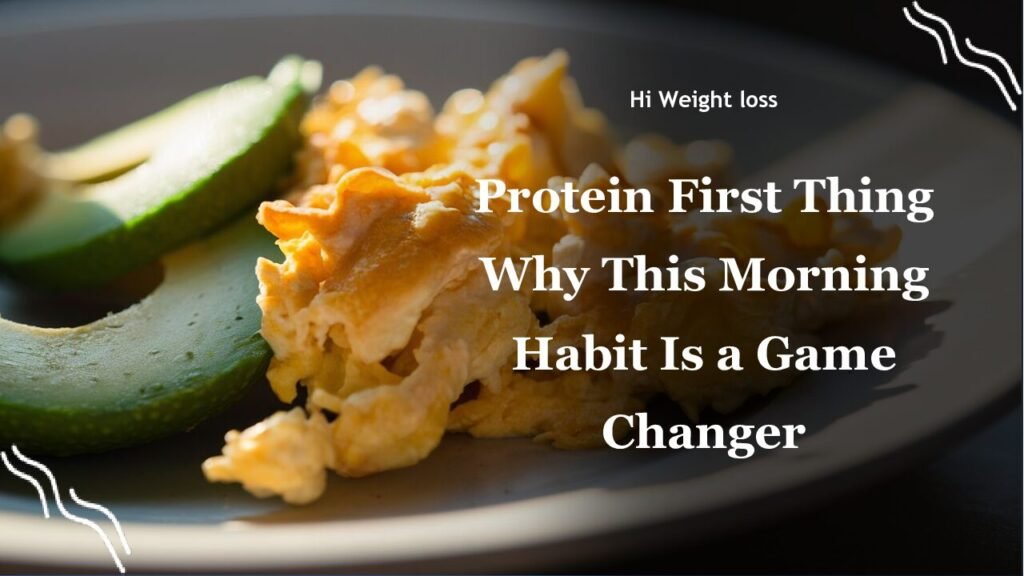Do you often find yourself crashing mid-morning, reaching for sugary snacks, or feeling like your energy levels are all over the place? Imagine a way to start your day feeling energized, focused, and satisfied, without that mid-morning slump. Eating _protein_ within 30 minutes of waking up could be the key to unlocking a more balanced and productive day. In this article, we’ll explore why incorporating protein early can stabilize your energy, help with weight management, and even regulate your hormones.
Why Eat Protein Within 30 Minutes of Waking Up?
The Science Behind Early Protein Intake
Let’s start with the science. Your body’s cortisol levels, which is known as the “stress hormone,” are naturally higher in the morning. Consuming _protein_ soon after waking can help regulate this hormone, preventing that chaotic spike that can come with a carb-heavy breakfast or just skipping breakfast entirely. This is important because high cortisol levels can lead to muscle breakdown, something you definitely want to avoid if you are looking to build muscle.
I remember a time when I was relying on a large coffee and a bagel for my morning routine. The result? I felt great for about an hour, then I would inevitably crash hard, leading to cravings for more carbs and sugar. It was a constant rollercoaster. When I started experimenting with a high-protein breakfast, I noticed a significant difference. The steady energy I experienced was a game-changer, and I didn’t feel the urge to snack constantly.
Stabilizing Blood Sugar and Managing Cortisol
A high-protein meal prevents a cortisol surge that is typically associated with carbohydrate-heavy mornings. According to an article in the Indian Express, eating protein first thing can help stabilize your blood sugar and minimize morning spikes in both insulin and cortisol. This is why a simple change in your eating habits can have such a significant impact. Instead of a sharp rise and fall in energy, you’ll experience a much more stable energy curve through the morning.
The body’s ability to regulate blood sugar is so important, and it’s often overlooked. I have a friend, Sarah, who used to experience constant cravings throughout the day, which she attributed to “just loving food.” She didn’t realize it could be tied to her high-carb, low-protein breakfast. After she started incorporating more protein, her cravings subsided, and she felt much more in control of her appetite. The article highlights how this small adjustment prevents muscle breakdown for fuel.
Steady Energy Source: Why It Matters
Are you tired of feeling like you need constant caffeine to keep going? A _high-protein breakfast_ acts as a consistent energy source, preventing your body from breaking down muscle for fuel. This often occurs when you skip breakfast or rely on simple carbohydrates, as mentioned in this expert report. This means you’ll have more consistent energy levels throughout the morning, without the jitters and crashes associated with sugary foods.
I have personally experienced the difference. After starting my day with a high-protein meal, I feel sustained and focused during my work hours. It’s a completely different feeling from the energy dips I used to experience after a carb-heavy breakfast. This is not just about “feeling good,” but also about optimizing your body’s performance and making the most out of your day.

Improved Satiety and Weight Management
Do you often find yourself reaching for a mid-morning snack? Eating a _high-protein breakfast_ can help you feel fuller for longer, reducing those mid-morning cravings. This is especially important if you’re trying to manage your weight. Research mentioned in this Mayo Clinic article, indicates that those who eat breakfast are better at maintaining their weight than those who skip it.
Many of my friends have also found that incorporating protein early in the day really does help them feel more satisfied and less likely to overeat later. It’s not about deprivation; it’s about giving your body the nutrients it needs to function optimally. According to UCLA Health, the focus on a protein-rich breakfast is key for managing cravings. This approach is so much more sustainable and enjoyable than restrictive dieting.
Hormone Regulation and Muscle Building
Beyond cortisol regulation, _proteins_ play a vital role in hormone production, binding, and regulation. These are all crucial for mood, metabolism, and much more. While high-protein meals may cause a temporary increase in cortisol, that’s a part of the glucose metabolism process as noted in the Indian Express report. This ensures a more balanced hormonal environment for your body. This effect on the body’s hormone system is crucial if you’re also trying to build muscle.
My brother, who is an avid bodybuilder, has emphasized the importance of this nutrient timing. He always tells me, that he focuses not only on having a sufficient amount of protein throughout the day but also on when he is consuming it. He’s seen significant improvements in his muscle gains and overall performance by including protein in his first meal of the day. The impact of protein goes beyond feeling full; it’s foundational for many important bodily processes.
Practical Tips for Incorporating Protein Early
Now that you understand the importance of early protein intake, here are some actionable tips on how to incorporate them into your breakfast. It doesn’t need to be complicated or time-consuming.
| Protein Source | Approximate Protein per Serving |
|---|---|
| Eggs (2 large) | 12 grams |
| Greek Yogurt (1 cup) | 20 grams |
| Protein Powder (1 scoop) | 20-30 grams |
| Cottage Cheese (1 cup) | 25 grams |
| Smoked Salmon (4oz) | 20 grams |
You can try a quick egg scramble, mix a protein shake, or enjoy a bowl of Greek yogurt. The goal is to find a protein source that suits your tastes and lifestyle. For an extra boost of flavor, consider adding fruits or nuts that complement your source of protein.
Conclusion
So, why eat protein within 30 minutes of waking up? It’s clear that it’s not just a fad, but a science-backed strategy for improving your overall well-being. By regulating cortisol, providing a steady energy source, enhancing satiety, and supporting hormone balance, a protein-rich breakfast can make a significant difference in how you feel and perform throughout the day. Think back to my experience with the constant energy crashes. It was only when I shifted my focus to a protein-rich start that things changed for the better. Now, I experience sustained energy, reduced cravings, and feel more in control of my day. We all have different bodies and different needs, however, this is worth trying to discover if it works for you.
It’s about making a simple yet powerful change to your routine. Consider adding a protein source to your breakfast and see how it impacts your energy, focus, and overall health. Why not give it a try? What’s your favorite way to get your protein first thing in the morning? Share your tips with us in the comments below!
FAQ
How much protein should I aim for in my breakfast?
Aim for around 20-30 grams of protein to get the full benefits of early protein intake. This can be achieved through a combination of eggs, Greek yogurt, protein powder, or other sources.
What are some quick and easy protein breakfast options?
Some quick options include a protein shake, Greek yogurt with berries and nuts, cottage cheese, or a quick egg scramble. Prepare these options the night before, and you will save time.
Can I still benefit from this if I don’t eat exactly within 30 minutes of waking up?
While 30 minutes is ideal, getting protein into your system within an hour is still beneficial. The key is to prioritize it as early in the day as possible.
Is it bad to have too much protein in the morning?
While it’s important to get enough protein, it’s also about balance. Excessively high protein intake can put a strain on your kidneys. A balanced breakfast should also include other essential nutrients.
Will a high-protein breakfast help with muscle gain?
Yes, a high-protein breakfast can support muscle protein synthesis, which is necessary for muscle building and repair, especially if you exercise regularly. The key is consistency and the right combination of nutrients.



